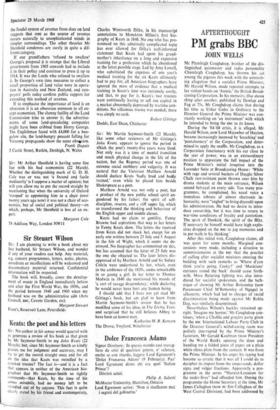On the state of bad economics
Sir: While heartily endorsing Arthur Shen- field's general, attitude to recent economic theorists I think it necessary to point out that his remarks on Henry George are misleading (22 March).
George's proposal was simple: to collect eco- nomic rent or land value as public revenue and correspondingly remit or abolish the conflict- ing web of penalising taxes from which we suffer. He was not the first to perceive this although when writing Progress and Poverty, 1879, he was unaware that others had, and in- dependently, expounded the same principle: among them the physioerats. Patrick Dove and Herbert Spencer in 1850. the Scottish judge Lord Macdonell some years later and Thomas Nulty, Bishop of Meath, and in New Zealand Sir George Grey, the great colonial adminis- trator, both when George was writing. Indeed
the feudal system of revenue from dues on land suggests that rent as the source of revenue occurs naturally to unsophisticated minds in simpler surroundings. The other theories Mr Shenfield condemns are surely in quite a dif- ferent category.
If our grandfathers 'refused to swallow' George's proposal it is strange that the Liberal government from 1905 onwards had to include it in their policy and continue to press it up to 1914. It was the Lords who refused to swallow it. In George's own time measures to collect a small proportion of land value were in opera- tion in Australia and New Zealand, and rate- payers' polls today confirm public support for extending this method of revenue.
If to emphasise the importance of land is an obsession it is an obsession common to all ex- cept economists. The clumsy futility of the Land Commission tries to answer it; the advertise- ments of some land-speculating companies might have been cribbed from Henry George. The Englishman faced with £4,000 for a bun- galow site, the land-hungry peasant falling for Vietcong propaganda show the same obsassion. Frank Dupuis 5 Castle Street, Ruthin, Denbigh, N. Wales







































 Previous page
Previous page